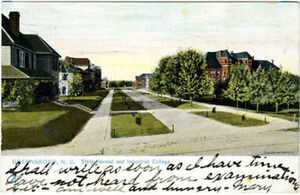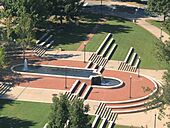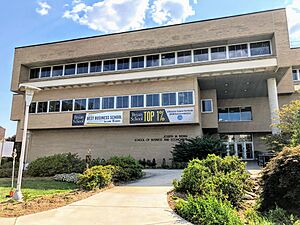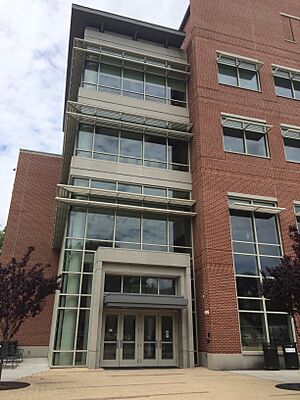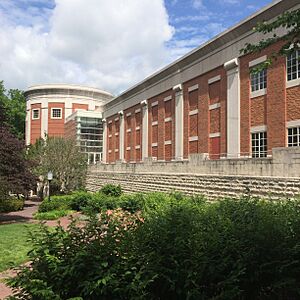University of North Carolina at Greensboro facts for kids
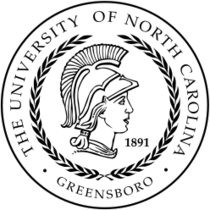 |
|
|
Former names
|
State Normal and Industrial School (1891–1896) State Normal and Industrial College (1896–1919) North Carolina College for Women (1919–1932) Woman's College of the University of North Carolina (1932–1963) |
|---|---|
| Motto | "Service" |
| Type | Public research university |
| Established | February 18, 1891 |
|
Parent institution
|
University of North Carolina |
| Accreditation | SACS |
|
Academic affiliations
|
CUMU |
| Endowment | $368.6 million (2022) |
| Chancellor | Franklin D. Gilliam, Jr. |
| Provost | Debbie Storrs |
|
Academic staff
|
1,145 (859 full-time and 286 part-time) (2019 fall) |
| Students | 19,764 (2020 fall) |
| Undergraduates | 15,995 (2020 fall) |
| Postgraduates | 3,769 (2020 fall) |
| Location |
,
,
United States
|
| Campus | Large city, 250 acres (100 ha) |
| Newspaper | The Carolinian |
| Colors | Gold, white, and navy blue |
| Nickname | Spartans |
|
Sporting affiliations
|
NCAA Division I FCS – SoCon |
| Mascot | "Spiro" the Spartan |
 |
|
The University of North Carolina at Greensboro (UNCG or UNC Greensboro) is a public university in Greensboro, North Carolina. It is a place where students can do special research. UNCG is part of the larger University of North Carolina school system.
This university offers many different study programs. Students can earn bachelor's, master's, and doctoral degrees. UNCG is also home to the Weatherspoon Art Museum, which has amazing art.
Contents
History of UNCG
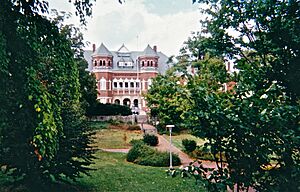
UNCG started as a college for women in 1891. It opened its doors in 1892. Charles Duncan McIver is given credit for helping to start the university. He was the first leader of the school.
In its first year, the school taught business, home economics, and teaching skills. There were 223 students and 15 teachers. The land for the school was given by R. S. Pullen and R. T. Gray. The state provided $30,000 to build the first building.
This university was the first public university in North Carolina created to educate women. By 1949, it was the largest all-female school in the country.
The school's name changed several times over the years. It started as the State Normal and Industrial School. Then it became the State Normal and Industrial College in 1896. In 1919, it was called North Carolina College for Women. In 1932, it became the Woman's College of the University of North Carolina. Finally, in 1963, it became the University of North Carolina at Greensboro. This was also the year men were first allowed to attend the school.
UNCG's Rankings and Recognition
Universities are often ranked to show how good they are. Here are some ways UNCG has been recognized:
- In 2023, Forbes magazine ranked UNCG among the top 650 universities in the U.S. It was also ranked among the top public universities.
- Money magazine also named UNCG as one of “America’s Best Colleges” in 2023.
- In 2022, U.S. News & World Report ranked UNCG among the top national universities. It was also recognized as a "Top Public School."
- Washington Monthly magazine ranked UNCG highly in 2020. They look at how well schools help students succeed and serve their communities.
Exploring the UNCG Campus
The UNCG campus has many old and important buildings. The Julius I. Foust Building was built in 1891. Spencer Hall and the Quad are also historic. The Chancellor's Residence and the UNCG Auditorium are other notable spots.
A statue of Minerva stands on campus. Minerva is a Roman goddess of wisdom. She has been a symbol of the university since 1894. The statue was put up in 2003.
UNCG Athletics: The Spartans
UNCG has a strong sports program. It started in the late 1940s. All UNCG teams are called the Spartans. They compete in NCAA Division I sports.
From 1982 to 1987, the Men's Soccer team won many national championships. Today, UNCG competes in the Southern Conference. This conference includes 10 schools across five states.
The men's basketball team plays their home games at the Greensboro Coliseum.
Lynne Agee was a very successful women's basketball coach at UNCG. She won over 600 games before she retired. She helped UNCG teams reach the national tournament many times. She was the first women's coach to take teams to the NCAA tournament in all three divisions.
Clubs and Fun Traditions
Student Clubs and Groups
UNCG has many clubs and organizations for students. In 2010, there were 36 honor societies. There were also 20 fraternities and sororities.
Students can join the student government, which started in 1910. There are also groups for different cultures. Some groups support LGBT students. Others are for fans of science fiction and fantasy. There are also many performing arts, religious, and service groups.
Students also create their own media. They publish the university newspaper, The Carolinian. They also make a fine arts magazine called CORADDI. The campus has its own radio station, WUAG.
Club Sports at UNCG
Club sports are student-run teams. They compete against other colleges. Here are some of the club sports at UNCG:
- Basketball (Women's)
- Bass Fishing
- Equestrian
- Esports
- Fencing
- Football
- Lacrosse (Men's)
- Lacrosse (Women's)
- Quidditch
- Rugby (Men's)
- Rugby (Women's)
- Running
- Soccer (Men's)
- Soccer (Women's)
- Softball
- Swimming
- Tennis
- Ultimate Frisbee (Women's)
- Volleyball
University Libraries
UNCG has a great library system. It has two main branches:
- The Walter Clinton Jackson Library is the main campus library. It holds special collections and university history.
- The Harold Schiffman Music Library focuses on music-related materials.
Other libraries on campus include:
- The Michel Family Teaching Resources Center.
- The Intercultural Resource Center Library.
Academic Programs and Schools
UNCG has many different schools and colleges. These are where students study specific subjects.
- College of Arts and Sciences
- College of Visual and Performing Arts
- Lloyd International Honors College
- Joseph M. Bryan School of Business and Economics
- School of Education
- School of Health and Human Sciences
- School of Nursing
- Joint School of Nanoscience and Nanoengineering
- The Graduate School
College of Arts and Sciences
This is the largest part of the university. It has nearly 500 full-time teachers. They teach subjects like art, history, social studies, science, and math.
All students at UNCG take general education classes. These classes help them learn about many different topics. The College of Arts and Sciences offers most of these courses.
English Department
The English Department started in 1893. It offers different degrees in English. The writing program is very popular. A writing center helps students with their writing. It helps all students and teachers on campus.
The English Department is in the Moore Humanities and Research Administration Building.
Lloyd International Honors College
The Honors College offers special programs for students. These programs let students study their subjects more deeply. They can also explore new topics.
Honors classes are usually small, with 20-25 students. They often combine different subjects. Students who want to earn "International Honors" or "Full University Honors" need to have an international experience. They also need to learn a second language.
Joseph M. Bryan School of Business and Economics
The Bryan School is the largest of UNCG's professional schools. It started in 1969. It is named after Joseph M. Bryan, a famous business person. This school is known for its high quality in business and accounting.
The Bryan School has many teachers and thousands of students. It also has over 20,000 former students.
What You Can Study
- Accounting and Finance
- Consumer, Apparel, and Retail Studies
- Economics
- Information Systems and Supply Chain Management
- Management
- Marketing, Entrepreneurship, Hospitality, and Tourism
School of Education
The School of Education helps train future teachers and leaders in education. It offers many programs, including advanced degrees.
The university itself started to train women educators in 1891. The idea was that educated women would teach their children. This would help improve education in the state.
The school became a full college in 1897. Students started earning bachelor's degrees in 1903. These degrees allowed them to teach in North Carolina.
College of Visual and Performing Arts
This college is home to over 900 students and more than 100 teachers. It includes the School of Music, Theatre and Dance. The Art Department also joined this college in 2016. Students can study music, acting, dance, and art here.
School of Nursing
The School of Nursing started in 1966. It helps train nurses. The first group of nursing students graduated in 1970. The school offers both undergraduate and graduate programs. Over 4,000 students have graduated from this school.
School of Nanoscience and Nanoengineering
The Joint School of Nanoscience & Nanoengineering ("JSNN") is a special project. It is a partnership between North Carolina Agricultural & Technical State University and UNCG.
This school offers advanced degrees in Nanoscience and Nanoengineering. Nanoscience is the study of very, very tiny things. Nanoengineering is about building things at that tiny scale.
The programs focus on three main areas:
- Nanobioscience: This looks at the biological and chemical side of nanoscience.
- Nanotechnology: This focuses on engineering and environmental aspects.
- Environmental nanoscience: This looks at how nanoscience affects the environment.
The Graduate School
The Graduate School at UNCG manages the advanced degree programs. About 3,600 graduate students attend from many different states and countries.
Notable Alumni
 | Kyle Baker |
 | Joseph Yoakum |
 | Laura Wheeler Waring |
 | Henry Ossawa Tanner |


